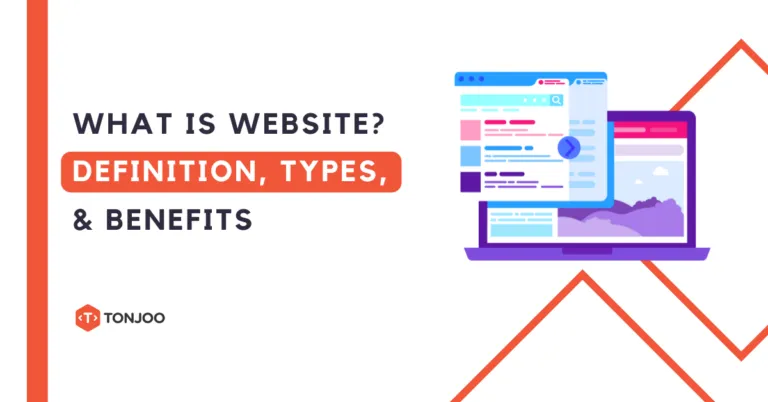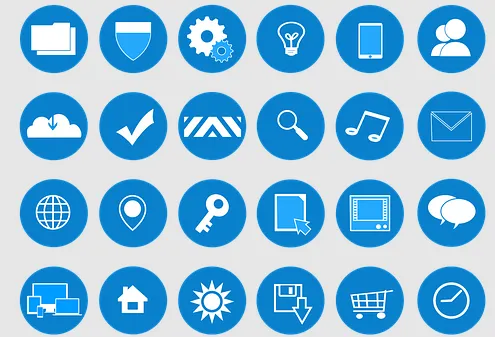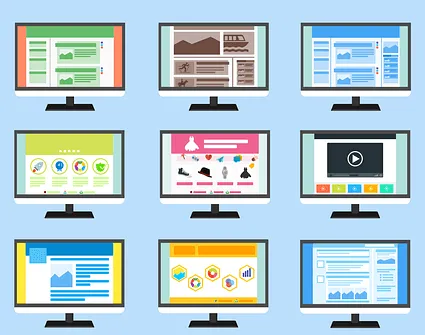
What is website? Almost everyone has interacted with a website, whether for entertainment or to find information. But when asked about the definition of website, many people still don’t know the actual meaning.
In fact, having a basic understanding of websites is important in today’s era of technological transformation. Especially if you are a business owner, a website can be an alternative platform for running your business.
So, don’t get left behind. Start expanding your knowledge by learning what a website is and what it’s used for on this page. In this article, the Tonjoo team will answer questions such as:
- What is a website?
- What are the different types of websites?
- What are the benefits of having a website?
Ready to learn? Let’s get started.
Table of Contents
What Is a Website? Definition and Examples
A website is anything we all visit and access every day on the internet. Whether it’s the Google homepage, Shopee, Tokopedia, or even the Tonjoo blog you’re currently reading. So, what exactly is meant by a website? And what are some examples of websites?
According to experts, a website is a platform that stores and hosts web pages, which can be accessed through the internet. A web page is a page that displays content and appears on a site. A website consists of web pages that contain specific information and are connected under one domain.
These can be accessed through a URL or web address. For example, the URL for Tonjoo is https://tonjoo.com/. When you visit that address, the homepage will appear, as shown below:
The page shown above is called the homepage. Meanwhile, the items inside the black box (about us, government, corporation, etc.) are called web pages.
At this point, you likely already have a clearer idea of what a website is and what examples look like. There are plenty of websites out there, and they’re easy to access on the internet. Just type a specific keyword into a search engine, and you’ll find articles and links directing you to various websites.
The Elements of Website

After learning what a website is and seeing some examples, let’s move on to discuss the key elements of a website. A website is made up of many components, but there are three that are the most essential and play the most vital roles.
Without these three elements, a website cannot be accessed or found on the internet. The three core elements are:
1. Hosting
Hosting is a platform that connects to hardware and the internet. Its main function is to store, host, and manage the website’s database. All data, such as text, media (images and videos), scripts, and more, are stored on a server in the form of hosting, making them accessible to users. One of the best hosting options you can use today is NEO WordPress by Biznet Gio Cloud.
This WordPress hosting in Indonesia offers an efficient and affordable solution without requiring you to manage a server manually. With a reliable Kubernetes infrastructure, your website is ensured high uptime, stable performance, and optimal loading speed.
Equipped with a free website builder and Generative AI features, creating engaging content becomes easier and faster. For more information, visit the Biznet Gio Cloud website. 
2. Domain
A domain is the name of a website that acts as the brand or identity of the site. Its main function is to help users access the site without having to type in a full IP address or long URL. A domain replaces an IP address and typically uses a unique and easy-to-remember name.
3. Content
The next essential element that every website has is content. Website content can take many forms, such as text, videos, images, illustrations, and more. Content also helps identify the type and purpose of a website.
There are e-commerce websites, news portals, company profiles, and many others. With just these three basic elements, anyone can start building a website. Interested in trying? You can follow this beginner-friendly guide: how to create a website using WordPress for free.
Easy and affordable! With this tutorial, you don’t need to be a web developer to build your own WordPress-based website.
Functions of a Website
As a digital platform, a website serves many purposes. Here, we’ve summarized the five most essential functions:
1. Source of Information
The main function of a website is to serve as an information hub, replacing traditional print media. Unlike print, the information shared on websites is highly diverse and can be accessed by the public more quickly and easily. Anyone can share and obtain information more conveniently through this platform.
2. Communication Medium
In addition to being an information source, a website also functions as a means of communication. Unlike social media platforms such as WhatsApp, Line, or Telegram, communication on a website is usually done through the blog’s comment section.
3. Online Business Platform
Have you ever bought or sold something online through an e-commerce site? That’s one of the most common functions of a website, as a platform for online business. Websites can facilitate online transactions, whether in the form of an e-commerce site, a marketplace, or a platform for selling digital products.
4. Branding and Marketing Tool
A website isn’t just a store you can build for business. It also serves as a powerful tool for branding and marketing. You can showcase all kinds of information there, including your profile and portfolio.
A well-designed website also adds to the impression of a more professional and high-quality business. It’s a win-win situation, you can run your business, introduce it to the public, and promote it all in one place.
5. Virtual Asset
Lastly, a website functions as a virtual asset. Running a website can generate value for its owner. For businesses, it can attract more customers. For institutions, it can boost credibility. For individuals, it can be a tool or platform to earn money in new ways. This makes a website a highly profitable business asset.
Types of Websites

In the early days of the internet, websites were mainly used to display written content. Today, they come in a much wider variety, featuring text, visuals, audiovisual elements, sound, illustrations, and more.
As technology continues to advance, websites have evolved into many different types. These types can generally be categorized based on their appearance and their function.
A. Types of Websites Based on Appearance
1. Static Websites
Static websites have a fixed layout and do not change frequently. Any updates are usually minor and often limited to the homepage design, while the content and other elements remain the same.
Examples of static websites include company profile pages or websites that display information about a business, organization, or institution.
2. Dynamic Websites
Dynamic websites are flexible and can easily be updated to meet current needs and trends. These websites typically have interactive interfaces and offer more advanced features. Examples include blogs, online stores, news portals, web-based information systems, and more.
3. Interactive Websites
As the name suggests, interactive websites are designed to facilitate user interaction. These are often categorized as social media platforms. Examples include Instagram, Facebook, and other similar platforms.
B. Types of Websites Based on Function
Websites can also be classified by their function. Some are built for entertainment, some for transactions, others for community building, blogging, and more. Here’s a breakdown of the most common types:
1. Personal Websites
Personal websites are used to share individual opinions and information, such as diary entries, creative works, or travel notes. They can also serve personal branding purposes, host online portfolios, or support professional needs.
These websites are typically not profit-oriented and focus on self-expression. You can create a personal website using platforms like WordPress.com or Blogspot.com.
2. Corporate Websites
These websites are designed to showcase a company’s profile and information to the public. They are often used for product promotion and brand building. Common examples include landing pages, corporate web portals, and company profile sites.
3. Institutional or Organizational Websites
Similar to corporate websites, these are used to share information, programs, and events related to an institution or organization. They are commonly used by educational institutions, government agencies, and non-profit organizations. Examples include school websites, government office websites, and the like.
4. Community Websites
Community websites display content submitted by contributors, either from within the community or from external users. Examples include Wikipedia, wikis, Kaskus, and other similar platforms.
5. E-commerce Websites
Chances are you’re already familiar with this type. E-commerce websites are platforms that facilitate online buying and selling, also known as online shops. These websites offer various tools to simplify the online shopping process and often include more complex, integrated features.
6. Media Websites
Media websites provide up-to-date content such as news articles, research findings, surveys, opinion pieces, and interviews with public figures.
7. Blogs
Blogs are websites that publish articles designed to provide valuable information to readers. The content varies depending on the blog’s niche and purpose. Popular topics include travel, technology, digital marketing, food, and more. Blogs can also be a source of income. Some successful Indonesian bloggers include:
- Marikxon Manurung (maxmanroe.com)
- Trinity (naked-traveler.com)
- Iwan Banaran (iwanbanaran.com)
- Taufik (tmcblog.com)
8. Entertainment Websites
Entertainment websites focus on providing fun and engaging content. These may include:
- Films
- Documentaries
- Music
- Comics
- Video games
Any site that’s designed primarily for enjoyment and amusement falls into this category.
Benefits of Having a Website

Websites offer wide-ranging benefits across nearly every area of life. We can categorize these benefits into three main areas: business, public, and personal. Let’s break down each of them.
1. Business
The impact of websites is most strongly felt in the business world. A business website can be a highly profitable tool. It also offers other key advantages such as:
- Boosting business visibility on Google search results
- Enhancing a business’s professional image
- Increasing credibility and consumer trust
- Serving as a platform for buying and selling (e-commerce/online stores)
2. Public
Websites also bring substantial benefits to the public and social sectors. For the general public, websites can be used to:
- Access information for daily needs
- Use public services like banks, hospitals, and other facilities
- Stay updated with the latest news
3. Personal
Don’t underestimate the personal benefits of having a website. Individuals can take advantage of websites in many ways, such as:
- Sharing information including hobbies, experiences, personal stories, and more
- Building a personal brand by showcasing a profile and portfolio
- Generating income through blogging or becoming an influencer
Beyond these benefits, websites also serve as platforms for sharing opinions and building communities. They offer a space for self-expression and personal growth. Thanks to the wide variety of community websites available today, it’s easier than ever to connect with people from all over the world.
Conclusion
From the explanation above, you now understand what a website is along with its functions, types, and benefits. With so many kinds of websites out there, which one do you want to create? Whatever type of website you choose, make sure it aligns with your needs and goals.
If you’re still unsure, you can rely on Tonjoo’s website development services as your solution. We don’t just build websites, we offer solutions to your digital challenges. You can also expand your knowledge about website plugins at Plugin Ongkos Kirim, or check out Pintar Jualan for tips on selling online.
That’s all for now. Hopefully this article helps you understand what a website is and gives you a solid foundation to explore the platform further. If you’re interested in working with us, feel free to contact the Tonjoo team through our official contact page. 
Read similar articles by Moch. Nasikhun Amin on the Tonjoo blog about WordPress, WooCommerce, plugins, and other web development topics.
Updated on April 17, 2025 by Moch. Nasikhun Amin



